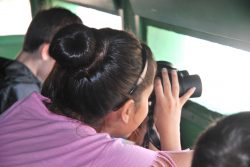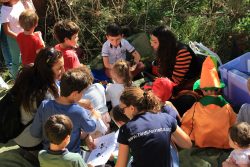Here at BirdLife Malta we strongly believe in education and the power it has to transform societies. We are very proud of our dedicated education team and the work they carry out with children and young adults. We also believe in lifelong learning and in the need to provide our community with reliable scientific information that can strengthen understanding of environmental issues. Nevertheless, we are aware that education does not only take place within the boundaries of organised activities. Children are also educated by the people they look up to.
In these troubled times for our country, many are those who feel morally compelled to reflect upon the values our society is built on and that we are passing on to our children. There is indeed much to worry about. Our collective behaviour is far from exemplary, including when it comes to caring for the environment.

Children see and understand far more than we think and indeed would like them to (Photo by Veerle van Werde)
Children are presented with what they must find a very puzzling picture – heaps of well-intentioned guidelines and daily breaches thereof. What is the use of teaching children to save a drop while brushing their teeth when the moment they step out of school they witness government-sponsored water waste in the form of sprinklers dousing roundabouts under a scorching sun? Can we truly expect children to understand the value of a nature reserve when they are made to share it with gun-toting men intent on plucking birds out of the sky? Textbooks state that CO2-emitting human activities are pushing the climate beyond dangerous thresholds but every single outing kids are taken on involves a fuel-guzzling car. These are very simple examples of observations that can make a young mind conclude that protecting our natural environment is ultimately something that can very well stay on the back burner.
Children see and understand far more than we think and indeed would like them to. They see that their parents are increasingly busy buying property, all the while grumbling about new construction projects ‘in their backyard’. They grow up and understand that gunshots and those ubiquitous RTO signs are the reason they cannot fully enjoy family walks. Their surroundings teach them only the hijacked definition of ‘development’ – that of the concrete beast encroaching on these islands’ natural environment.

Today’s children could become adults who place the environment and social justice before the economy. (Photo by Pascale Kouassigan)
Moments such as this, when emotions are raw and exposed, are crucial in the history of a nation. We need to reflect on our attitude and lifestyle as well as on the example people in positions of authority are setting – not only politicians but indeed all public figures, government representatives, managers, teachers, police officers– and ask ourselves whether we are happy with this state of affairs and whether we are willing to change and fight for change.
At BirdLife Malta’s AGM last week, Minister Herrera stated that Maltese people are spoilt and as a result reluctant to stray from their comfort zone. Yet, that ‘comfort zone’ is a man-made construct. If we set the right example and teach our children to think freely and creatively, they might grow up to consider that inhaling exhaust for one hour in a traffic jam beneath a million-euro flyover is not more comfortable than riding a bike that will get them to their destination in half the time. They might figure out that enjoying green areas, soothed by birdsong, is much more important to their health and wellbeing than accumulating material possessions.
Presented with sound facts and given a consistent example to follow, today’s children could become adults who place the environment and social justice before the economy, because ultimately a surplus in money does not automatically translate into a high standard of living and a greedy, complacent society will never be a truly progressive one.
By Irene Mangion, BirdLife Malta Council member
